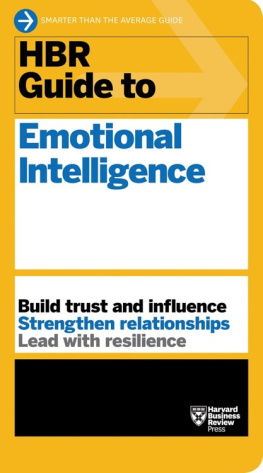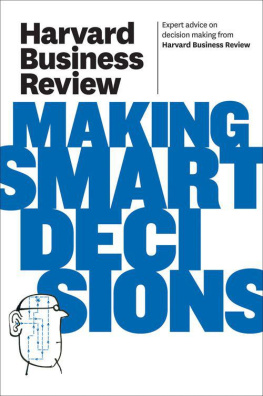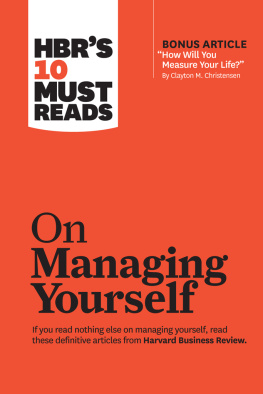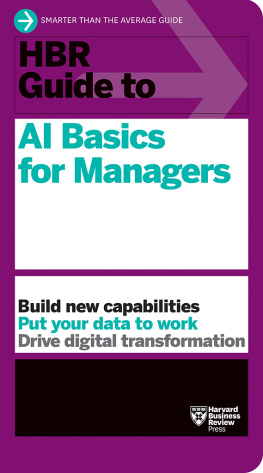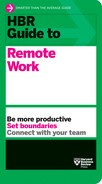Harvard Business Review - HBR Guide to Emotional Intelligence (HBR Guide Series)
Here you can read online Harvard Business Review - HBR Guide to Emotional Intelligence (HBR Guide Series) full text of the book (entire story) in english for free. Download pdf and epub, get meaning, cover and reviews about this ebook. genre: Home and family. Description of the work, (preface) as well as reviews are available. Best literature library LitArk.com created for fans of good reading and offers a wide selection of genres:
Romance novel
Science fiction
Adventure
Detective
Science
History
Home and family
Prose
Art
Politics
Computer
Non-fiction
Religion
Business
Children
Humor
Choose a favorite category and find really read worthwhile books. Enjoy immersion in the world of imagination, feel the emotions of the characters or learn something new for yourself, make an fascinating discovery.
- Book:HBR Guide to Emotional Intelligence (HBR Guide Series)
- Author:
- Genre:
- Rating:5 / 5
- Favourites:Add to favourites
- Your mark:
- 100
- 1
- 2
- 3
- 4
- 5
HBR Guide to Emotional Intelligence (HBR Guide Series): summary, description and annotation
We offer to read an annotation, description, summary or preface (depends on what the author of the book "HBR Guide to Emotional Intelligence (HBR Guide Series)" wrote himself). If you haven't found the necessary information about the book — write in the comments, we will try to find it.
Harvard Business Review: author's other books
Who wrote HBR Guide to Emotional Intelligence (HBR Guide Series)? Find out the surname, the name of the author of the book and a list of all author's works by series.
HBR Guide to Emotional Intelligence (HBR Guide Series) — read online for free the complete book (whole text) full work
Below is the text of the book, divided by pages. System saving the place of the last page read, allows you to conveniently read the book "HBR Guide to Emotional Intelligence (HBR Guide Series)" online for free, without having to search again every time where you left off. Put a bookmark, and you can go to the page where you finished reading at any time.
Font size:
Interval:
Bookmark:
Arm yourself with the advice you need to succeed on the job, from the most trusted brand in business. Packed with how-to essentials from leading experts, the HBR Guides provide smart answers to your most pressing work challenges.
HBR Guide to Being More Productive
HBR Guide to Better Business Writing
HBR Guide to Building Your Business Case
HBR Guide to Buying a Small Business
HBR Guide to Coaching Employees
HBR Guide to Data Analytics Basics for Managers
HBR Guide to Delivering Effective Feedback
HBR Guide to Emotional Intelligence
HBR Guide to Finance Basics for Managers
HBR Guide to Getting the Right Work Done
HBR Guide to Leading Teams
HBR Guide to Making Every Meeting Matter
HBR Guide to Managing Stress at Work
HBR Guide to Managing Up and Across
HBR Guide to Negotiating
HBR Guide to Office Politics
HBR Guide to Performance Management
HBR Guide to Persuasive Presentations
HBR Guide to Project Management
HARVARD BUSINESS REVIEW PRESS
Boston, Massachusetts
HBR Press Quantity Sales Discounts
Harvard Business Review Press titles are available at significant quantity discounts when purchased in bulk for client gifts, sales promotions, and premiums. Special editions, including books with corporate logos, customized covers, and letters from the company or CEO printed in the front matter, as well as excerpts of existing books, can also be created in large quantities for special needs.
For details and discount information for both print and ebook formats, contact .
Copyright 2017 Harvard Business School Publishing Corporation
All rights reserved
No part of this publication may be reproduced, stored in or introduced into a retrieval system, or transmitted, in any form, or by any means (electronic, mechanical, photocopying, recording, or otherwise), without the prior permission of the publisher. Requests for permission should be directed to , or mailed to Permissions, Harvard Business School Publishing, 60 Harvard Way, Boston, Massachusetts 02163.
The web addresses referenced in this book were live and correct at the time of the books publication but may be subject to change.
Library of Congress cataloging-in-publication data is forthcoming.
ISBN: 9781633692725
eISBN: 9781633692732
Its been two decades since Daniel Golemans research showed that emotional intelligence is twice as important as other skills in determining outstanding leadership. By managing your emotions and relating well to others, he explained, you can achieve higher levels of influence as well as personal well-being.
This kind of emotional intelligence is not just an innate trait: It can be learned. Becoming more finely attuned to your own emotions allows you to determine how to use those feelings more productively to make stronger decisions, overcome negative thoughts, control yourself in volatile situations, or understand others when they act in a way that surprises or angers you. Getting feedback from trusted colleagues and friends can keep you honest and aware of your areas of weakness, especially in the social sphere. And whether youre writing a difficult email, looking to keep your cool in a bitter negotiation, or managing an upset direct report, an array of frameworks and tactics can help you approach the situation in a way that takes the human element into account.
This guide will help you navigate these approaches. Youll get better at:
- Identifying and managing your own emotions
- Persuading and influencing others
- Dealing with difficult colleagues
- Responding to stress productively
- Defusing tense conversations
- Using your feelings as data to help you make smarter decisions
- Avoiding emotional pitfalls in a negotiation
- Reacting to tough situations with resilience
- Helping others on your team develop their emotional intelligence
- Developing a strong emotional culture
Definitions and reflections from experts.
Quiz yourself.
BY ANNIE MCKEE
Dont just try to ignore your negative feelings.
BY ART MARKMAN
Get precise.
BY SUSAN DAVID
No other leadership behavior has a bigger effect on employees.
BY CHRISTINE PORATH
Use them as data.
BY SUSAN DAVID
Reframe negative thoughts and neutralize bad behavior.
Use your body to take a break from your minds chatter.
BY LEAH WEISS
You cant just apologize and move on.
BY SUSAN DAVID
Human communication for the digital age.
BY ANDREW BRODSKY
Use empathy to understand potential conflicts.
BY ANNIE MCKEE
Spark growth rather than frustration.
BY MONIQUE VALCOUR
Emotional tagging both helps and hinders our ability to choose.
BY ANDREW CAMPBELL, JO WHITEHEAD, AND SYDNEY FINKELSTEIN
How to avoid the pitfalls of anxiety and anger.
BY ALISON WOOD BROOKS
Its harder to read others across borders.
BY ANDY MOLINSKY
Reverse a rivalry by building trust.
BY BRIAN UZZI AND SHANNON DUNLAP
Cut to the underlying issues.
BY AMY GALLO
Dont be a hero.
BY SANDRA L. ROBINSON AND KIRA SCHABRAM
Three types critical for leaders.
BY DANIEL GOLEMAN
The Dalai Lama, cognitive science, and the power of caring.
BY DANIEL GOLEMAN (INTERVIEWED BY ANDREA OVANS)
Recovering your self-image.
Three traits of people who emerge stronger from trauma.
BY DIANE COUTU
Treat yourself as you would others.
BY CHRISTOPHER GERMER
Resilience isnt about powering through.
BY SHAWN ACHOR AND MICHELLE GIELAN
A self-assessment.
BY MANFRED F. R. KETS DE VRIES
Its not as easy as a carrot or a stick.
BY ANNIE MCKEE
BY LIANE DAVEY
Translate the organizations mission to the micromoments of everyday work life.
BY SIGAL BARSADE AND OLIVIA A. ONEILL
Like it or not, leaders need to manage the mood of their organizations. The most gifted leaders accomplish that by using a mysterious blend of psychological abilities known as emotional intelligence. Theyre self-aware and empathetic. They can read and regulate their own emotions while intuitively grasping how others feel and gauging their organizations emotional state.
But where does emotional intelligence come from? And how do leaders learn to use it? The management literature (and even common sense) suggests that both nature and nurture feed emotional intelligence. Part genetic predisposition, part life experience, and part old-fashioned training, emotional intelligence emerges in varying degrees from one leader to the next, and managers apply it with varying skill. Wisely and compassionately deployed, emotional intelligence spurs leaders, their people, and their organizations to superior performance; naively or maliciously applied, it can paralyze leaders or allow them to manipulate followers for personal gain.
We invited 18 leaders and scholars (including business executives, leadership researchers, psychologists, a neurologist, a cult expert, and a symphony conductor) to explore the nature and management of emotional intelligenceits sources, uses, and abuses. Their responses differed dramatically, but there were some common themes: the importance of consciously and conscientiously honing ones skills, the double-edged nature of self-awareness, and the danger of letting any one emotional intelligence skill dominate. Here are some of their perspectives.
Font size:
Interval:
Bookmark:
Similar books «HBR Guide to Emotional Intelligence (HBR Guide Series)»
Look at similar books to HBR Guide to Emotional Intelligence (HBR Guide Series). We have selected literature similar in name and meaning in the hope of providing readers with more options to find new, interesting, not yet read works.
Discussion, reviews of the book HBR Guide to Emotional Intelligence (HBR Guide Series) and just readers' own opinions. Leave your comments, write what you think about the work, its meaning or the main characters. Specify what exactly you liked and what you didn't like, and why you think so.

